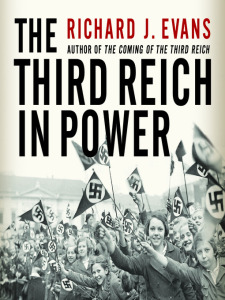 5 of 5 stars
5 of 5 stars
Series: The History of The Third Reich 2
My version: Audiobook
Non Fiction Germany, WWII
The Penguin Press
2005
StoryTel subscription
The definitive account of Germany’s malign transformation under Hitler’s total rule and the implacable march to war.
By the middle of 1933, the democracy of the Weimar Republic had been transformed into the police state of the Third Reich, mobilised around the cult of the leader, Adolf Hitler. If this could happen in less than a year, what would the future hold? Only the most fervent Nazi party loyalists would have predicted how radical the transformation ahead would be.
In The Third Reich in Power, Richard J. Evans tells the story of Germany’s radical reshaping under Nazi rule. Every area of life, from literature, culture, and the arts to religion, education, and science, was subordinated to the relentless drive to prepare Germany for war. His book shows how the Nazis attempted to penetrate and reorder every aspect of German society, encountering many kinds and degrees of resistance along the way but gradually winning the acceptance of the German people in the long run.
Those who were seen as unfit to be counted among the German people were dealt with in increasingly brutal terms. The Nazi regime took more and more radical measures against the racially “unfit,” including Germany’s Jews, Gypsies, homosexuals, mentally ill, “asocial” and “habitual” criminals. After six years of foreign policy brinkmanship that took the Nazi regime from success to success, Hitler’s drive to prepare Germany for the war he saw as its destiny reached its fateful hour in September 1939. The war he unleashed was to plunge the world into a maelstrom of genocide and destruction. The Third Reich in Power is the fullest and most authoritative account yet written of how, in six years, Germany was brought to the edge of that terrible abyss.
There are, I doubt it not, shorter histories of The Third Reich, but none better.
Authoritative, exhaustive and thoroughly, mind-bogglingly fascinating from the first word to the last, The Third Reich series, this being as consistent as The Coming of The Third Reich, is a look at what happened, rarely, as far as I could tell, delving into the nuances of the why. That is surely meant for the reader to do, that’s what I was doing all the way through. For any reasonable person the paths will all lead to the same conclusion of course, so if you need ever to put a supporter of any aspect of the Nazis ideas back in their box, you’ll find the means and resources here. If you’ve had any contact with other books on the Second World War you’ll find much of the background to the German side here.
Some of the main take-aways I got were: Those lower down the scale, even those a rung down from Hitler, were opportunistic. They used ‘the regime’ to give free reign to excess, of their own inclinations. The Nazis in power had made them feel untouchable, and feel that anything they did would be approved by those above them. Until those above them saw them as a threat, of course. Any laws that were needed to justify any policy intentions, were introduced retroactively. The parallels of what Stalin was up to in Russia are startling all the way through the book. That they felt the need to have laws, even retroactively, surprised me, when they had total control of just about everything. But, of course, they were never 100% popular – no matter what their polling figures said – so maybe it was to protect their insecurity.
There was massive resentment for the previous generation, from the young and the survivors, stemming from the defeat in World War I. They felt the generation above them, had let them and the concept of ‘Germany’ and Germanic European supremacy, down. Humiliation was often used to describe the Treaty of Versailles. Hitler used this zeitgeist and of course blamed the Jews. Though, as you’ll read, distrust for the Jews and a desire to rid Europe (especially) of them, wasn’t either Hitler’s idea, or exclusively his aims in the thirties. There was also that part of the German/Prussian character that refused to admit they had been beaten and as things had turned out differently to how they had anticipated, it could not have been them, or their fault, so looked for people to blame. While there was a whole load of Germans, especially Prussians, who wouldn’t want to have been associated with Hitler, that was often because of his lowly background rather than a distaste for his policies. He wanted to ‘restore’ German hegemony over Europe and the world – and that was of course something they could go along with.
It is perhaps not for the faint-hearted, leaving no Nazi stone left unturned as it does, so maybe think of it as a resource, a reference to use for any questions other book on WWII you read might raise. You can read it all the way through, as I did and thoroughly immerse yourself in pre-War Germany, but do be prepared to put aside some time to fully do it justice.
I read The Coming of The Third Reich on an iPhone (that wasn’t easy), this one as an Audiobook (very good) and I’ve decided to read the final volume, The Third Reich at War, as a paperback.
The cover at the top, is the cover of the Audiobook version I ‘read.’ The paperbacks, linked to, have different covers, but are the same book.
You can buy The Third Reich in Power from Booksplea.se
Related reviews on Speesh Reads:






